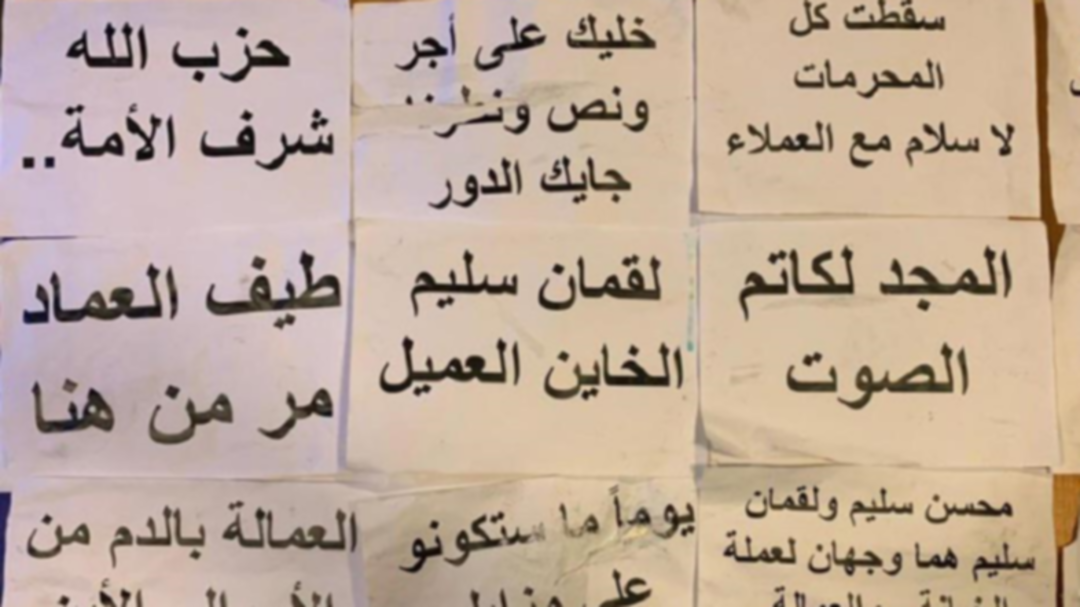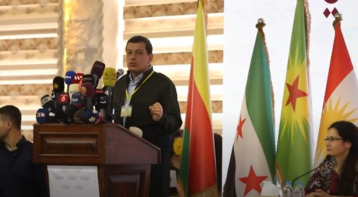-
Attack on Hezbollah critic sheds light on group’s shifting tactics

Support has been pouring in for Lokman Slim, a well-known critic of Hezbollah, after he began receiving threats in the form of notes left at his home that “his turn was next.”
Slim’s ordeal began on Tuesday when he and Makram Rabah, an American University in Beirut lecturer, were surrounded by Hezbollah supporters in Martyr’s Square tent after taking part in a public debate.
The debate on “Neutrality as a strategic concept for the return of prosperity” was being held at a tent event called The Hub in Martyrs’ Square. Organizers said the focus of the forum was regional conflict.
But days before it was held on December 10, Pierre Abi-Saab, an editor with the pro-Hezbollah newspaper al-Akhbar, tweeted for his followers to disrupt the forum claiming that the event centered around the normalization of ties with Israel.
“We know who you are. We know who your backers are. We know your agendas. That is your deception, and this is our reality,” Abi-Saab tweeted four days before the seminar.
Speaking to Al Arabiya’s sister channel Al Hadath live during the incident, Rabah said the disruptors who showed up to the event claimed they were fighting for the Palestinian cause and accused The Hub organizers of being Zionist supporters.
“We not facing protesters, we are facing people who are linked to the pro-Iranian parties who are falsely claiming that our seminar is in defense of staying out of the Arab-Israeli conflict. This is completely false,” Rabah said at the time.
Slim, director of Hayya Bina and UMAM, a Lebanese organization that focuses on Shia politics and social dynamics, said it was clear that the organizers had no intention of discussing Israel at the seminar and that pro-Hezbollah supporters were using new tactics to distract critics.
“The new strategy Hezbollah started adopting was when they noticed that their muscular strategy was not working. So, they infiltrated the squares by finally sending their people under pseudo leftists slogans and muscles … mainly under the slogan of fighting Israel. What happened on the evening of 11th was a first expression which then continued the day after when they burned the tent,” Slim said.
The same protesters who disrupted the seminar the night before then returned to the square and burned The Hub’s tent but then also proceeded to burn the neighboring tents belonging to other protesters.
“They then raided the house of my family and my home,” he added. “It is a long standoff which became clear over the last days.”
A day after the incident at Martyr’s Square, Slim received printed papers with threats that read: “One day, you will be the trash of history” and “No peace with agents”.
According to Hanin Ghaddar, a Friedmann Visiting Fellow at The Washington Institute who focuses on Shia politics, the incident in Beirut bears the markings of a shift in Hezbollah’s strategy from using media tactics to physical force to silence its critics.
“Right now, it's beyond the media campaign. I think this is what's really new. It is actually physical attacks. It's not just discrediting them and calling them American spies. It's going after physical attacks in the sense that they actually went ahead and sent people to besiege the tent, the Hub, burning and destroying it and going actually after
The incident came days before Hezbollah Secretary General Hassan Nasrallah gave his first televised address in more than a month when he claimed that the United States was using the protests in Lebanon as a tool to pressure Iran.
According to Ghaddar, Hezbollah tolerates Shia protesters who join the demonstrations against the ruling elite, except when it comes to directly criticizing Hezbollah.
“At the end of the day, they can easily be arrested, targeted and beaten up. And that happened actually in the south many, many times. They went after their families and they went to their homes and interrogated them. So, of course, you get to a point where you decide that your safety and your family is more important than one moment on the street,” Ghaddar said.
“You have a lot of people who joined the protests in Nabatieh, Tyre, Baalbek at the beginning. And it's becoming a nightmare for them,” she added.
Lebanese protesters have come under repeated attacks from pro-Hezbollah and Amal party supporters who have attempted to disrupt protests in Beirut and other cities. Days after the protesters first erupted across Lebanon, demonstrators came under attack in Nabatieh, a Shia town considered a stronghold for the Iranian-backed organization and its allies, from men reportedly from Hezbollah and the associated Amal party, led by Nabih Berri.
For Slim, the Lebanese activist said he has become used to receiving threats since 2008 but that he felt this time it might be different.
“I never considered that I should speak out for myself but what happened over the past 48 hours didn't concern me only, it concerns my family, my mother, my sister, my wife and my colleagues. Therefore, I went public. I felt that's it's my moral duty to speak out and say that enough is enough. If you
You May Also Like
Popular Posts
Caricature
BENEFIT Sponsors BuildHer...
- April 23, 2025
BENEFIT, the Kingdom’s innovator and leading company in Fintech and electronic financial transactions service, has sponsored the BuildHer CityHack 2025 Hackathon, a two-day event spearheaded by the College of Engineering and Technology at the Royal University for Women (RUW).
Aimed at secondary school students, the event brought together a distinguished group of academic professionals and technology experts to mentor and inspire young participants.
More than 100 high school students from across the Kingdom of Bahrain took part in the hackathon, which featured an intensive programme of training workshops and hands-on sessions. These activities were tailored to enhance participants’ critical thinking, collaborative problem-solving, and team-building capabilities, while also encouraging the development of practical and sustainable solutions to contemporary challenges using modern technological tools.
BENEFIT’s Chief Executive Mr. Abdulwahed AlJanahi, commented: “Our support for this educational hackathon reflects our long-term strategic vision to nurture the talents of emerging national youth and empower the next generation of accomplished female leaders in technology. By fostering creativity and innovation, we aim to contribute meaningfully to Bahrain’s comprehensive development goals and align with the aspirations outlined in the Kingdom’s Vision 2030—an ambition in which BENEFIT plays a central role.”
Professor Riyadh Yousif Hamzah, President of the Royal University for Women, commented: “This initiative reflects our commitment to advancing women in STEM fields. We're cultivating a generation of creative, solution-driven female leaders who will drive national development. Our partnership with BENEFIT exemplifies the powerful synergy between academia and private sector in supporting educational innovation.”
Hanan Abdulla Hasan, Senior Manager, PR & Communication at BENEFIT, said: “We are honoured to collaborate with RUW in supporting this remarkable technology-focused event. It highlights our commitment to social responsibility, and our ongoing efforts to enhance the digital and innovation capabilities of young Bahraini women and foster their ability to harness technological tools in the service of a smarter, more sustainable future.”
For his part, Dr. Humam ElAgha, Acting Dean of the College of Engineering and Technology at the University, said: “BuildHer CityHack 2025 embodies our hands-on approach to education. By tackling real-world problems through creative thinking and sustainable solutions, we're preparing women to thrive in the knowledge economy – a cornerstone of the University's vision.”
opinion
Report
ads
Newsletter
Subscribe to our mailing list to get the new updates!






















